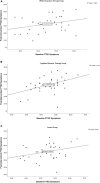Investigating the Feasibility, Acceptability and Efficacy of Using Modified-Written Exposure Therapy in the Aftermath of a Terrorist Attack on Symptoms of Posttraumatic Stress Disorder Among Afghan Adolescent Girls
- PMID: 35463492
- PMCID: PMC9027104
- DOI: 10.3389/fpsyt.2022.826633
Investigating the Feasibility, Acceptability and Efficacy of Using Modified-Written Exposure Therapy in the Aftermath of a Terrorist Attack on Symptoms of Posttraumatic Stress Disorder Among Afghan Adolescent Girls
Abstract
Background: The aim of this study was to assess the efficacy, acceptability and feasibility of using modified written exposure therapy (m-WET) to treat symptoms of posttraumatic stress disorder (PTSD) in Afghan adolescent girls in the aftermath of a terrorist attack.
Methods: 120 Afghan (Hazara) adolescent girls who had been exposed to the Sayed al-Shuhada school terrorist attack were randomly assigned to the m-WET (n = 40), trauma-focused cognitive behavior therapy (TF-CBT) (n = 40), or control groups (n = 40). m-WET involved five consecutive daily group sessions where participants simply wrote about the terrorist attack including thoughts and feelings. TF-CBT was an intensive five-session group intervention. The control group had no additional contact. The trial was undertaken at a local non-government organization in Kabul. The primary analysis was comparing PTSD symptoms (Child Revised Impact of Event Scale-13) in the three groups at post-intervention and three-month follow-up.
Results: Overall, participant and facilitator satisfaction with m-WET was high. Acceptability of m-WET was relatively high, with 15% drop-out in the m-WET group and all m-WET sessions were attended. While the groups did not differ significantly in PTSD symptoms at baseline, the m-WET group had significantly lower levels of PTSD symptoms compared to the control group at post-intervention and follow-up. There was no significant difference between the m-WET and TF-CBT groups.
Conclusion: The findings suggest m-WET may be promising intervention for the treatment of PTSD among adolescent girls in humanitarian settings. Further research in the area is warranted.
Keywords: Afghan adolescents; cognitive behavior therapy; posttraumatic stress disorder; writing for recovery; written exposure therapy.
Copyright © 2022 Ahmadi, Musavi, Samim, Sadeqi and Jobson.
Conflict of interest statement
The authors declare that the research was conducted in the absence of any commercial or financial relationships that could be construed as a potential conflict of interest.
Figures



Similar articles
-
Examining MEmory Training for Recovery-Adolescent among Afghan adolescent boys: a pilot randomised controlled trial.Eur J Psychotraumatol. 2023;14(2):2251780. doi: 10.1080/20008066.2023.2251780. Eur J Psychotraumatol. 2023. PMID: 37672117 Free PMC article. Clinical Trial.
-
Acceptance and commitment therapy versus trauma-focused cognitive behavior therapy: A comparative study of the effects on the posttraumatic stress symptoms of female Afghan adolescents.Am Psychol. 2024 Dec;79(9):1452-1459. doi: 10.1037/amp0001451. Am Psychol. 2024. PMID: 39715408 Clinical Trial.
-
Feasibility and acceptability of written exposure therapy in addressing posttraumatic stress disorder in Iranian patients with breast cancer.Psychooncology. 2023 Jan;32(1):68-76. doi: 10.1002/pon.6037. Epub 2022 Sep 28. Psychooncology. 2023. PMID: 36116086 Clinical Trial.
-
Psychological therapies for the treatment of post-traumatic stress disorder in children and adolescents (Review).Evid Based Child Health. 2013 May;8(3):1004-116. doi: 10.1002/ebch.1916. Evid Based Child Health. 2013. PMID: 23877914 Review.
-
[Posttraumatic stress disorder (PTSD) as a consequence of the interaction between an individual genetic susceptibility, a traumatogenic event and a social context].Encephale. 2012 Oct;38(5):373-80. doi: 10.1016/j.encep.2011.12.003. Epub 2012 Jan 24. Encephale. 2012. PMID: 23062450 Review. French.
Cited by
-
Feasibility and acceptability of written exposure therapy group in a virtual outpatient setting.J Trauma Stress. 2025 Jun 3:10.1002/jts.23175. doi: 10.1002/jts.23175. Online ahead of print. J Trauma Stress. 2025. PMID: 40458859
-
Afghan mental health and psychosocial well-being: thematic review of four decades of research and interventions.BJPsych Open. 2023 Jul 10;9(4):e125. doi: 10.1192/bjo.2023.502. BJPsych Open. 2023. PMID: 37424447 Free PMC article. Review.
-
Randomised clinical trial investigating memory training for recovery-adolescents in addressing psychiatric concerns among adolescents in Iraq.J Glob Health. 2025 May 5;15:04111. doi: 10.7189/jogh.15.04111. J Glob Health. 2025. PMID: 40319505 Free PMC article. Clinical Trial.
-
State of the Science: Written Exposure Therapy for the Treatment of Posttraumatic Stress Disorder.Behav Ther. 2024 Nov;55(6):1222-1232. doi: 10.1016/j.beth.2024.02.004. Epub 2024 Feb 29. Behav Ther. 2024. PMID: 39443063 Free PMC article. Review.
-
Effect of the Memory Training for Recovery-Adolescent Intervention vs Treatment as Usual on Psychiatric Symptoms Among Adolescent Girls in Afghanistan: A Randomized Clinical Trial.JAMA Netw Open. 2023 Mar 1;6(3):e236086. doi: 10.1001/jamanetworkopen.2023.6086. JAMA Netw Open. 2023. PMID: 36995710 Free PMC article. Clinical Trial.
References
-
- United Nations Office for the Coordination of Humanitarian Affairs. 2018 Afghanistan Humanitarian Needs Overview. New York, NY: United Nations Office for the Coordination of Humanitarian Affairs; (2018).
LinkOut - more resources
Full Text Sources
Medical
Miscellaneous

